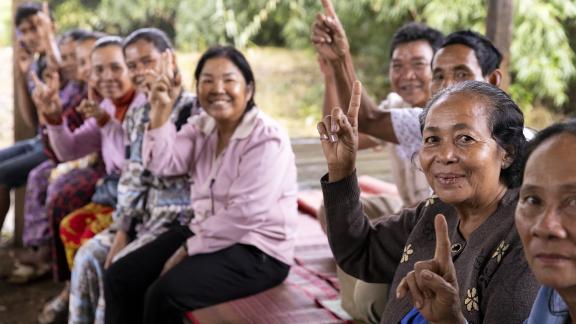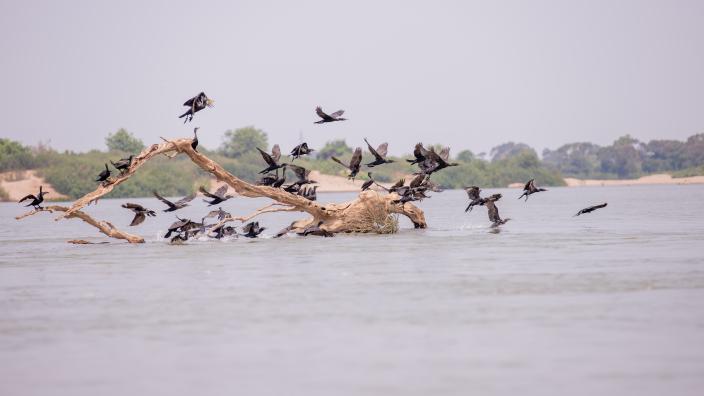Context
The Mekong River Basin is vital to millions of people across the region, sustaining ecosystems, livelihoods, trade, and environmental services. Yet, it faces mounting threats from uncoordinated large-scale development, unsustainable resource extraction, poorly planned infrastructure, and climate change. These pressures jeopardize food security, income stability, and ecological integrity.
In 2024, the basin experienced a drier wet season and normal to low water levels during the dry season. Dam restrictions further reduced the Mekong flood pulse and limited the annual expansion of Tonle Sap Lake, disrupting its critical role in fish spawning. Climate extremes compound these challenges:
- Floods affect around 90,000 people annually, projected to rise to 160,000 under high-emission scenarios.
- Severe droughts in 2015–2016 and 2019 caused rice production losses of up to $100 million.
- Heatwaves in Cambodia exceed 35°C for over 60 days a year, intensifying risks for rain-fed agriculture.
- Modeling suggests annual river flows in Tonle Sap’s sub-basins could decline by up to 41% by the 2090s, threatening both wet and dry season water availability.
These changes destabilize fish breeding cycles, particularly for migratory species dependent on seasonal flooding, undermining the livelihoods of millions reliant on fishing and farming.
Approaches
The Inclusive Water Governance and Climate Resilience Phase 3 (IP3) project seeks to advance resilient, inclusive, and sustainable development of the Mekong Basin in Cambodia. It strengthens governance and community resilience to climate and human-induced changes in access to riverine resources through three interconnected pillars:
Pillar 1: GEDSI and Feminist Influencing
- Promotes leadership and representation of diverse women leaders, including Indigenous women and People with Disabilities (PWDs).
- Influences water resource governance (WRG) and climate resilience policies.
- Serves as a flagship standalone pillar, integrated across the other two pillars.
- Builds capacity of communities, civil society networks, and coalitions to engage in evidence-based policy advocacy.
- Ensures inclusivity of marginalized groups including youth, PWDs, and Indigenous Peoples in WRG decision-making processes.
Pillar 2: Inclusive Water Resource Governance (WRG)
- Builds capacity of communities, civil society networks, and coalitions to engage in evidence-based policy advocacy.
- Ensures inclusivity of marginalized groups including youth, PWDs, and Indigenous Peoples in WRG decision-making processes.
Pillar 3: Climate Resilient Communities
- Promotes integrated community water resource management.
- Strengthens disaster and climate risk management.
- Supports climate change adaptation for resilient livelihoods.

IP3 empowers women leadership and marginalized groups in climate resilient water governance. Photo: Oxfam
Oxfam, in partnership with local NGOs, promotes inclusive and sustainable water resource management through community empowerment and collaboration with diverse stakeholders including civil society organizations, governments, private sector actors, academia, and regional institutions. IP3 prioritizes marginalized voices, ensuring equitable outcomes by investing in tangible benefits for 5% PWDs and 10% Indigenous Peoples. Technical expertise is provided by People’s Action for Inclusive Development (PAfID) to enhance capacity for engaging PWDs in water governance and climate resilience planning.
Implementing partners
- My Village Organization (MVi)
- Culture and Environment Preservation Association (CEPA)
- 3S Rivers Protection Network (3SPN)
- NGO Forum on Cambodia (NGOF)
- People’s Actions for Inclusive Development (PAfID)
Strategic partners
- Ministry of Environment (MOE)
- Ministry of Water Resource and Meteorology (MoWRAM)
- Cambodia National Mekong Committee (CNMC)
- Mekong River Commission (MRC)
- National Committee for Sub-National Democratic Development Secretariate (NCDD-S)
- National Committee for Disaster Management (NCDM)
- Fisheries Administration (FiA)
- Sub-National Administrations (Kratie, Stung Treng and Ranakiri Provinces)

